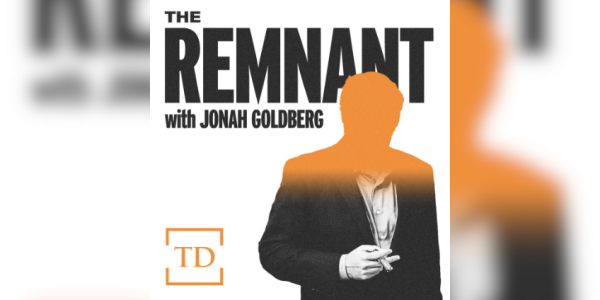The British pound has been taking a beating—yes, a pounding—falling to an all-time low against the U.S. dollar, and the conventional wisdom is that this is the result of the Liz Truss government’s eat-dessert-first “mini-budget,” which is big on tax cuts and popular subsidies, and short, in the view of many critics,on long-term prudence and credibility. Of all the many wonderful things the British might have imported from the United States, you’d think that they would have chosen something more useful, maybe a written constitution or something like that, rather than Washington-style fiscal incontinence. Instead, the Tories seem to have taken a page from the recent Republican playbook: tax cuts, higher debt, and distant memories of balanced-budget talk.
That’s one view. Daniel Hannan sees things a little differently.
Hannan, who does not answer the telephone as “Baron Hannan of Kingsclere,”
almost escaped British politics after contributing mightily to the successful campaign to abolish his old job as a U.K. member of the European Parliament. Instead he was lured into the House of Lords at the last minute by Boris Johnson. He observes that while the recent action has been dramatic, the pound has been on a declining trajectory vs. the dollar for more than a decade, falling sharply in 2008 from its pre-financial crisis value of more than $2 and trudging gloomily toward dollar parity. And the pound isn’t the only currency that has been sputtering against the dollar recently: With the Fed pushing up interest rates to fight inflation, the dollar has strengthened not only against the British currency but also markedly so against the currencies of China, South Korea, and, especially, Japan, where the central bank has been sticking to ultra-low interest rates in the hope of goosing economic growth that has alternated between miniscule and negative in recent years.
“This has been a strong-dollar story for a long time,” Hannan says, though he concedes that the long-term trend does not explain the sudden sharp drop after the mini-budget presentation, even while he remains unconvinced that tax cuts are the driving issue. “If we look at why the pound has been falling vis-à-vis the dollar, not in general but since Friday, it’s very, very difficult to sustain the idea that this is about excessive tax cuts.”
The actual tax cuts in the budget, he argues, are pretty small: Cutting the top tax rate from 45 percent to 40 percent will cost something between 2 billion pounds (the Truss government’s estimate) and 6 billion pounds (the estimate of the independent Institute for Fiscal Studies). “The sums are trivial,” Hannan says, with the income-tax moves being accompanied by “even smaller sums on things like reducing the property tax you pay when you buy a new house.”
The major changes in tax policy were not tax cuts per se but the abandonment of a package of planned tax increases, one involving the corporation tax and the other involving national insurance. The big items on the budget aren’t Reaganite tax cuts but Nixonian command-and-control measures, notably trying to freeze Britons’ energy bills as an anti-inflationary measure. Even if you treat the abandonment of planned tax increases as tax cuts, by far the largest single item on the new fiscal agenda is the energy-bill freeze, a populist social-welfare subsidy posing as an anti-inflation policy, one that will cost the government some 60 billion pounds or more.
Hannan argues this most recent swing in the pound is better understood as more of an interest-rate story: While the U.S. Fed is pushing up rates with some sense of urgency, the Bank of England is taking a more leisurely approach. “Liz Truss made a lot of noise during the leadership contest about reversing the monetary policy the Bank of England has been pursuing, in particular raising interest rates,” Hannan says. “There was some question about whether the chancellor [of the exchequer, Kwasi Kwarteng] would do something about that, announce a new mandate for the Bank of England or give some indication that he had at least spoken to the chiefs, but there was no hint of that, and the Bank of England had just raised rates by less than expected two days before [the presentation of the mini-budget]. Truss wants higher interest rates, something closer to the historical norm. High interest rates would be a sign not that her policy is failing but succeeding. As yet, that hasn’t happened.”
Hannan does not take a conspiratorial view of this, but a mostly disinterested overseas observer might note that one obvious way for Truss’ government to put pressure on the Bank of England to raise interest rates more quickly would be to introduce a whole raft of new debt-enabled spending and throw in some tax cuts that would signal just enough fiscal laxity to put immediately noticeable downward pressure on the pound.
Right now, the United Kingdom is having a 1980s flashback, with critics of the Truss government—including 1980s fossil Joe Biden, who, incredibly enough, is president of the United States of America—scorning her supposed “trickle-down” economic policy.
“Trickle down” was never a very good description of what supply-siders thought or think, but there is a good deal of old-school right-wonkery in the Truss government. Truss herself is a former think-tank executive and writer of economic-policy white papers, having served as deputy director of the center-right policy organization Reform, and in 2018 she met with a number of right-to-libertarian policy activists on a trip to the United States, sitting down with the American Enterprise Institute, the American Legislative Exchange Council, and Americans for Tax Reform, among others.
But even if the Truss government gets the policy mostly right—if—there’s the politics and the timing: Some of those tax cuts and other reforms don’t poll very well, and Labour already is making some remarkable electoral headway with complaints about Truss’ “budget for the rich” and the supposed domination of policy priorities by “the City,” as London’s high-finance sector is known. Labour is, in fact, enjoying a 17-point lead in the polls—its best position in two decades.
“That’s the other, more depressing explanation,” Hannan says, “that market analysts now think that a Labour government is more likely, because cutting the tax, though it makes a lot of economic sense, is politically unpopular.” Hannan thinks that the Truss government’s policies are likely to prove effective, creating the right conditions for stronger economic growth, but that the benefits are unlikely to be appreciated before the next election, which will come sometime before January 2025.
“They have to show that the pro-growth, non-fiscal levers they’re stabbing at will work,” he says. “The fiscal aspects of this statement have received a lot more attention than everything else, but that everything else is worth dwelling on for a moment. For the first time since the 1980s, the government is trying to make things easier on businesses and independent entrepreneurs.” He points to efforts to simplify the complex tax treatment of independent contractors as one example, along with Truss’ more ambitious effort to loosen up British childcare regulations. “We have the most expensive child care in the developed world,” Hannan says. “A couple with average income and two kids spend a third of post-housing disposable income on childcare because of ridiculous ratios of how many staff you need per child—the Swedes, the Danes, and the Germans all have less stringent ratios or none at all. That’s going to be swept away, and that will make a difference.”
Other big items on the Truss agenda are likely to take a long time to produce tangible results—among those are selling off surplus government land to build new housing and making it easier for the United Kingdom to access its own natural gas and other energy resources. (Fracking is back—probably.) “There is a load of pro-growth stuff in here,” Hannan says. “The worst thing ministers could do would be to waver in the face of bad headlines—on the contrary, they’ve got to show that they’re going to do these things and that the stimulus effects will be tangible. You’ve got to show that you are prepared to do unpopular things.”
Of course, showing that you are prepared to do unpopular things presupposes actually being prepared to do unpopular things. Liz Truss’ government is ready with any number of spoonfuls of sugar—but what the pound needs right now is strong medicine.









Please note that we at The Dispatch hold ourselves, our work, and our commenters to a higher standard than other places on the internet. We welcome comments that foster genuine debate or discussion—including comments critical of us or our work—but responses that include ad hominem attacks on fellow Dispatch members or are intended to stoke fear and anger may be moderated.
You are currently using a limited time guest pass and do not have access to commenting. Consider subscribing to join the conversation.
With your membership, you only have the ability to comment on The Morning Dispatch articles. Consider upgrading to join the conversation everywhere.